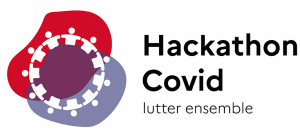The different waves of the epidemic have seen the mobilization of a very active ecosystem of public and private actors, which has led to the creation of new resources and services that have been acclaimed by the general public, such as Covid Tracker, Brisons la Chaîne and more recently Covidliste.
Initiated by civil society actors and organized with the support of the Interministerial Directorate of Public Transformation as part of the "open government", a 48-hour design and development marathon is organized on April 23 and 24, 2021. The aim is to strengthen the tools and solutions available to the French people in the face of the pandemic.
During two days, participants will be able to initiate new projects, contribute to their development, get inspired by feedback and training sessions and meet actors mobilized in the fight against the pandemic.
This hackathon is open to all those who have an idea, a skill, a know-how or a curiosity for data related to the Covid-19, and who wish to work to create common solutions to fight the pandemic.
This hackathon is organized around four challenges:
- Better support for COVID victims in the short and long term
- Streamline the vaccination campaign
- Monitoring the evolution of the pandemic in a different way
- Measuring risks and encouraging virtuous behavior
Référence :
One year after the German hackathon #WirvsVirus
On March 20 and 21, 28,000 people participated in the hackathon #WirvsVirus (WevsVirus) in Germany. It was the largest digital ideas competition in Germany to date.Through this hackathon, professional associations and NGOs, with the support of the federal government, invited the public to imagine and implement digital tools to address a range of problems revealed by the epidemic and "challenges" to be met.
Many developers had registered to take part, but also marketing, logistics and creative specialists.
In the days leading up to the hackathon, several hundred challenges were listed on a platform: food delivery, distribution of medical supplies, improvement of the testing process, organization of childcare services, respect for containment, respect for social distancing, neighborhood solidarity, the fight against fake news, monitoring of the epidemic, real-time location of free hospital capacity nationwide, visibility of "improvised" distance learning tools, crisis communication, protection of vulnerable groups, and mental health in isolation.
Within 48 hours, 28,000 citizens had developed about 1,500 ideas.
The website NetzPolitik, dedicated to digital politics, draws a rather positive review positive assessment of this initiative. The German government has kept its commitments and supported 130 project teams. 30 of them were born.
- Some projects have encountered "significant barriers to entry
- Some solutions had an effect in the days following the hackathon:
- The Corona School platform, for example, has connected more than 18,000 students with more than 13,000 volunteer tutors.
- The Association for Innovation in Public Health (InÖG) took advantage of the hackathon to enhance the open source case tracking and support software Sormas with new features and to make it interoperable with other software.
In an article about this initiative a year ago, Netzpolitik noted that " if 30 to 40 projects are implemented after this hackathon, we can say that it is a success. " In view of the projects that are still in development, it is a bit too early to say, but it seems that this number will be reached" concludes NetzPolitik.
Référence :





